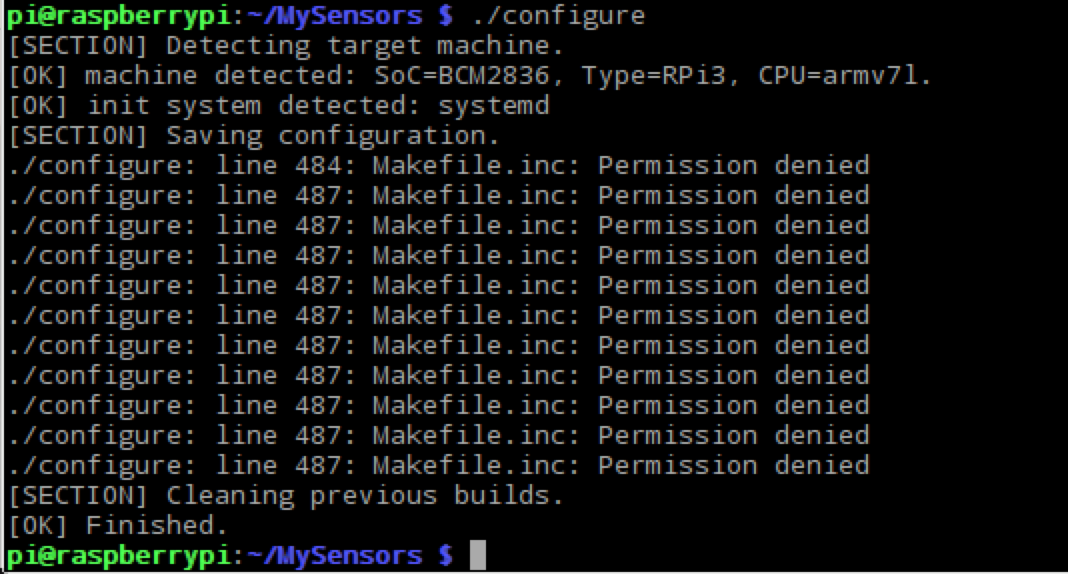💬 Building a Raspberry Pi Gateway
-
@eyesoft
As far as I understand, MySensors relay on PubSubClient for MQTT and it does not allow to publish messages with QOS=1 or 2, only 0.
Retain is different that QOS, it offers the possibility to recover the state for a device that loose connection for a while (e.g. after a restart). I find it very usefull. For example I have to restart the controller. When come back I got all states to their real values if retain=true. Otherwise they goes to the default, usually 0.
I have now 6 nodes, each with several sensors and relays.
-
please help

every time after reboot i have to run this codesudo ./bin/mysgw -dso built a virtual usb but after reboot ....
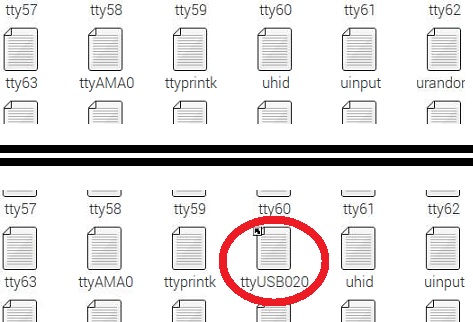
how put this code in startup ?
 please help thank you
please help thank you
-
From the Building a Raspberry Pi Gateway article:
If you wish to install:
sudo make installThe last command will provide instructions for your system on how to start the gateway on every boot.
-
@marceloaqno
i do it but after reboot serial lost again
just with command work againsudo ./bin/mysgw -d
-
@marceloaqno
i'm sorry
after sudo make install i must run this lines:sudo systemctl enable mysgw.service sudo systemctl start mysgw.servicesorry thank you
-
@marceloaqno can you build a rs485 gateway on raspberry pi ?
-
@Mihai yes you are right
-
This data that I get when I run ./mysgw --d , where is it stored and how can I get it to push it on cloud? Please help.
-
Data is not stored... to store the data and do something usefull with it (or not) you need a controller. I use mycontroller, and from this software you can "push" data to an external server.
I use my controller, but i am sure that other controller software also has this feature.
-
@Tag , The controller must be using something to get the data right? How can we do it directly without using the controller?
-
@hek It looks like development is the default branch in the repository. I was following the build instructions and couldn't figure out why I kept getting "connection refused". Just typing up a troubleshooting post when I saw my log said 2.2.0-beta. Sure enough when I grabbed master(2.1.0) instead it ran fine. Should probably add a checkout in the instructions.
-
@pete1450 could you clarify which instructions should be updated?
The instructions at https://www.mysensors.org/about/arduino recommend using the Arduino IDE Board manager, which will get the latest stable version.
Edit: Now I see. The link in the first post in this thread. It doesn't mention the master branch because up until Dec 25th the development branch was required. But now that 2.1 has been released the instructions should indeed use the stable version. I've updated the instructions. Thanks for noticing!
-
This is also new for me since i do not send data into any cloud... but i can imagine that you can use MQTT. (see https://www.mysensors.org/build/mqtt_gateway for more details) is important that the receiving side supports MQTT. in this case google is your friend

if you do a ./configure --help you will find you can build the mysensors gateway with MQTT support
./configure --help ... --my-gateway=[ethernet|serial|mqtt] Gateway type, set to none to disable gateway feature. [ethernet] --my-node-id=<ID> Disable gateway feature and run as a node with given id. --my-controller-url-address=<URL> Controller or MQTT broker url. --my-controller-ip-address=<IP> Controller or MQTT broker ip. --my-port=<PORT> The port to keep open on gateway mode. If gateway is set to mqtt, it sets the broker port. ...
-
ran sudo ./bin/mysgw -d
I keep getting mysgw: accept: Bad File Descriptor.
Any possible cause ?
-
I am trying to get the raspi ethernet gateway running but on both my pi 3 (also running openHAB) and the pi B (pretty basic install).
Unfortunately I get the same error on both.
Any ideas what could be going on here?
I am running the latest gateway and the latest raspbian.
mysgw: Starting gateway... mysgw: Protocol version - 2.1.0 mysgw: MCO:BGN:INIT GW,CP=RNNG---,VER=2.1.0 mysgw: TSF:LRT:OK mysgw: TSM:INIT mysgw: TSF:WUR:MS=0 mysgw: TSM:INIT:TSP OK mysgw: TSM:INIT:GW MODE mysgw: TSM:READY:ID=0,PAR=0,DIS=0 mysgw: MCO:REG:NOT NEEDED mysgw: connect: Connection refused mysgw: failed to connect mysgw: Eth: connect mysgw: connect: Connection refused mysgw: failed to connect mysgw: Eth: connect
-
I am using a Rasp Pi 3 as well.
I can't even proceed further in the tutorial cause of this error cause nothing works after it.
-
@marceltrapman @LaMB95
Could you post the complete ./configure command used to configure the gateway?
-
@marceloaqno Sure, forgot it

sudo ./configure \ --my-gateway=ethernet \ --my-controller-ip-address=192.168.1.xx \ --my-port=5003 \ --my-transport=nrf24
-
@marceltrapman Are you sure it's not a problem with your controller?
Have you tried connecting to your controller using telnet?telnet 192.168.1.x 5003
-
@marceloaqno !
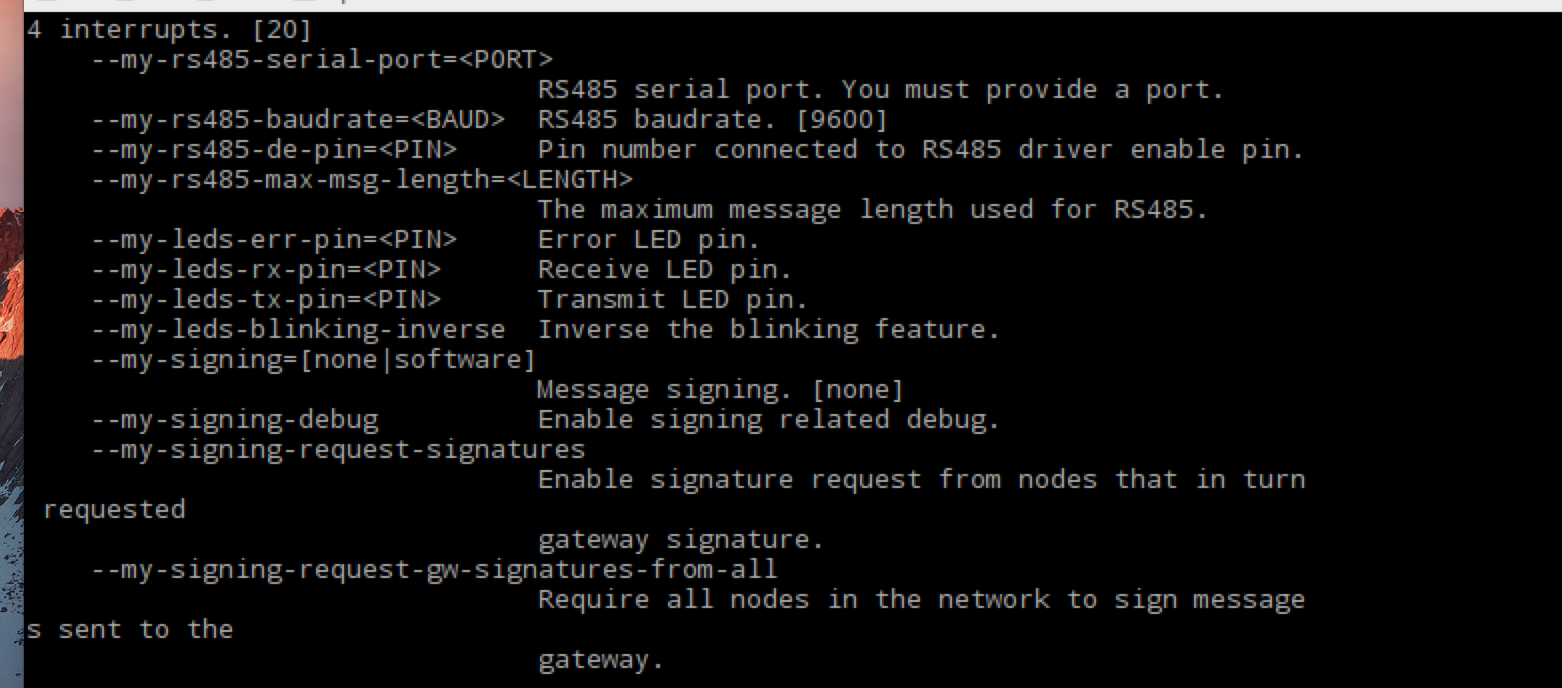
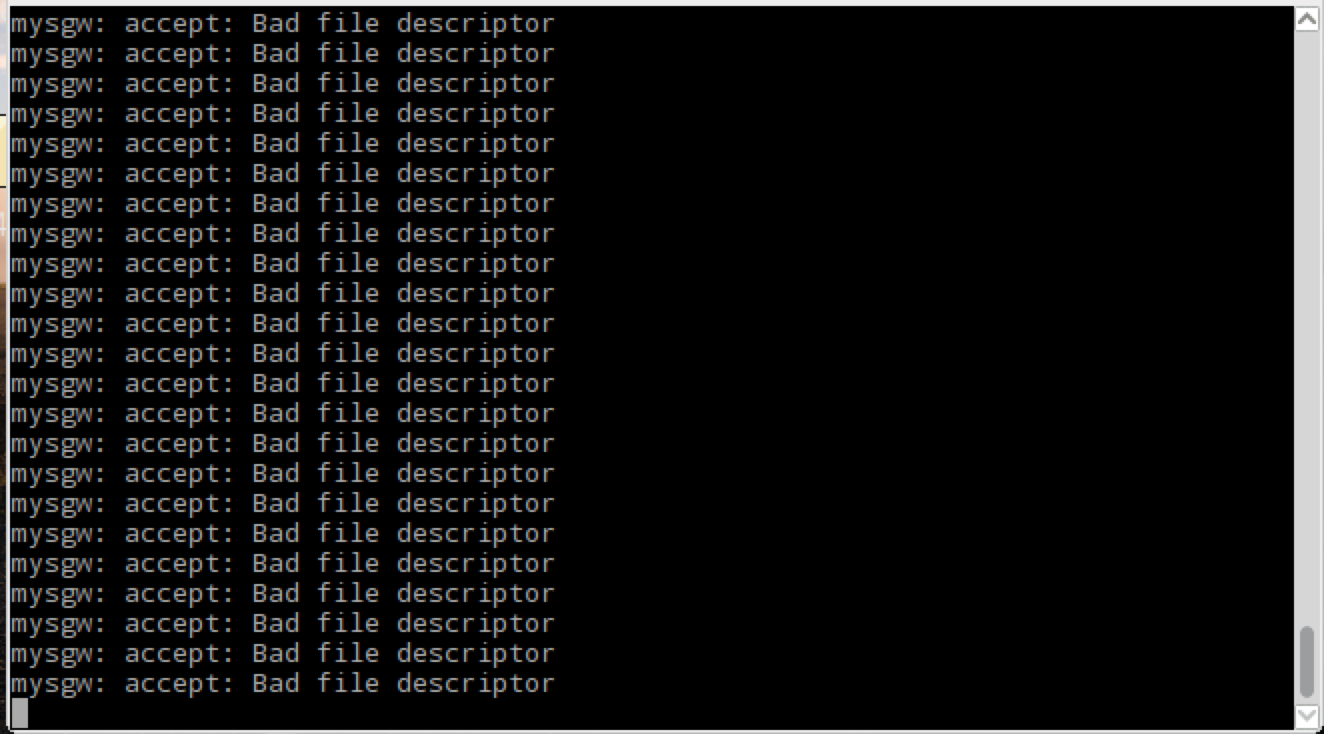
Is this what you meant?
-
@marceloaqno not sure no.
So, I downloaded telnet on the same raspi that I want to use as the gateway and the issue seems to be that port 5003 is not available.
Funny but how do I solve this.
It can't be an issue with the firewall because it allows all traffic on the internal network.
-
@marceloaqno and the same from the controller to the gateway gives the same error on that port

-
@Reza Yes, you can use rs485 in the RPi.
./configure --my-transport=rs485 --my-rs485-serial-port=<YOUR_SERIAL_PORT>For more options, run:
./configure -h
-
@LaMB95 No, I meant the options you used when you ran ./configure
-
@tiana
"The Broadcom SoC has three independant SPI interfaces, however only one of these is brought out to the GPIO connector, and that one SPI interface has 2 Chip enable lines."
More info here: https://www.raspberrypi.org/forums/viewtopic.php?f=44&t=22608
-
@marceloaqno from the docs I assume it is the gateway that has to open up port 5003 but I guess it does not because it can't connect to the ethernet (for some reason) or am I wrong?
-
@marceloaqno
i means that without arduino and usb port, similar to raspberry gateway ( raspberry +nrf24)
i means connect rs485 module to GPIO raspberry pi with domoticz
with domoticz
-
I m sorry I m new to using a raspberry pi and its for a project.
But if this is not what you asked for could you be a little more specific :$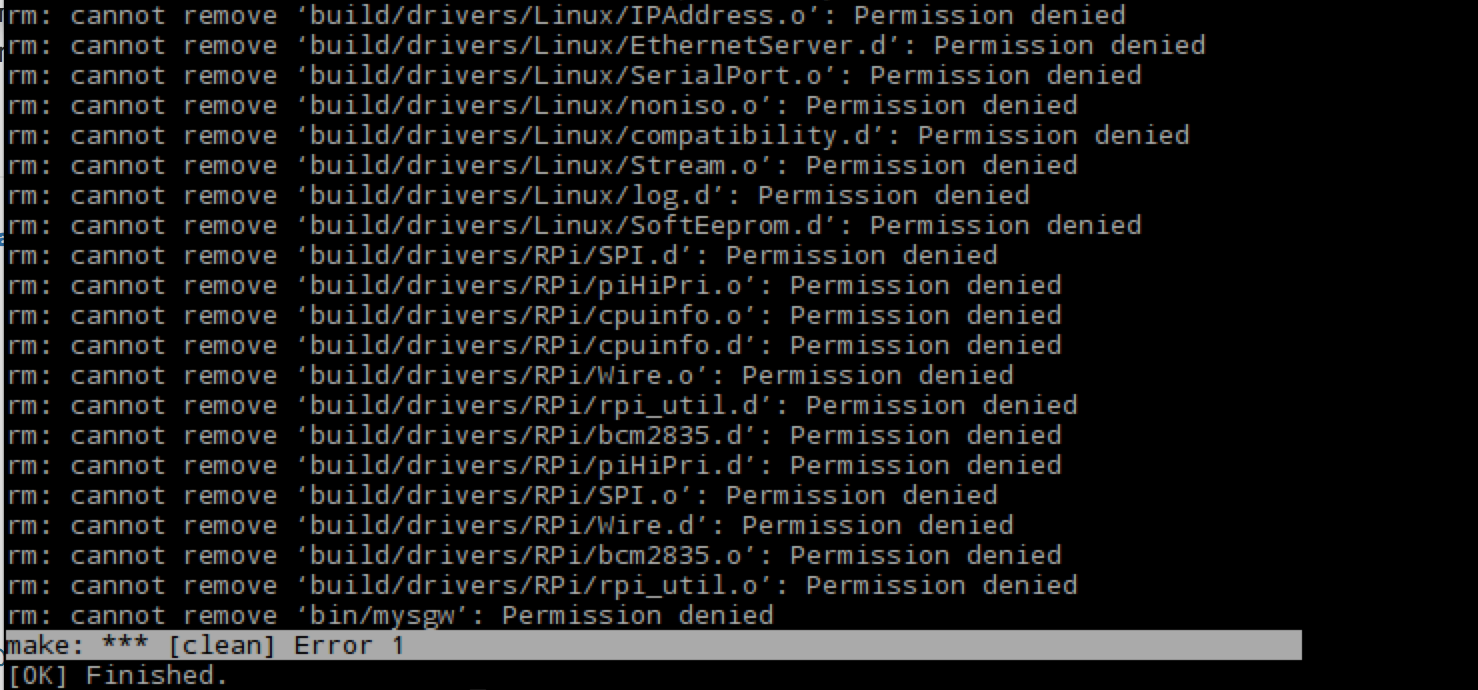
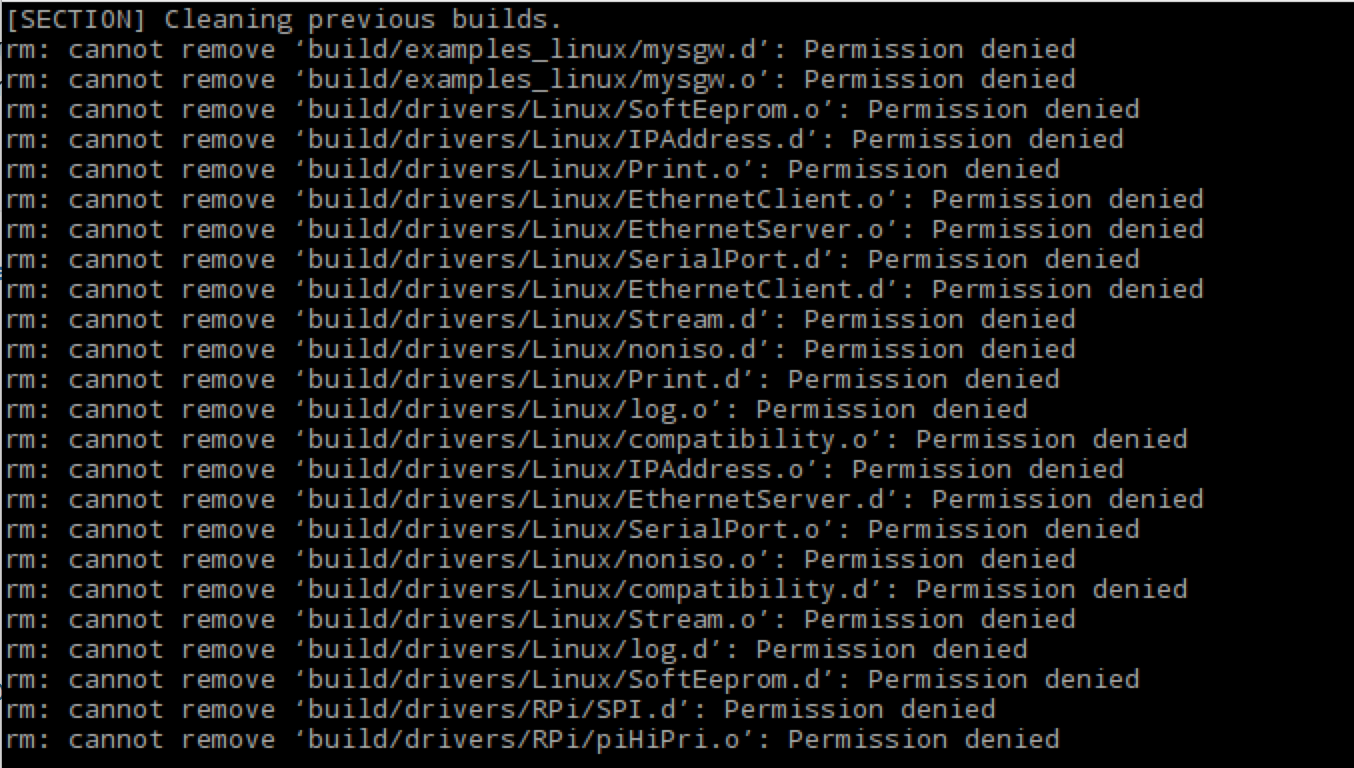
-
use sudo

-
Oh and one other thing, when I set the gateway up for MQTT it works.
-
If you use the --my-controller-ip-address= option, the gateway will act as a client and attempt to conect to the supplied ip and port. If you want the gateway to open port 5003, omit this option.
-
@Reza You could connect the rs485 to the RPi UART and use the option --my-rs485-serial-port=/dev/ttyAMA0, but you need to turning off the UART functioning as a serial console.
Or, to make things easier:
rs485 <==> TTL/USB <==> RPi
-
@marceloaqno
i am beginner and i can not turning off the UART functioning. . . also on some board usb port after power off/on lost and i should disconnect/connect cable... i test your steps serial gateway with raspberry and GPIO with virtual usb serial . and i see this problem solve and after power off/on gateway is connect .
i suggest that you add this commands to page of rs485 gateway step by step and update this .
(https://www.mysensors.org/build/rs485)I thank you for hard working and trying
-
if you want use rpi /dev/ttyAMA0 for rs485 gateway -
- remove string "console=serial0,115200" from /boot/cmdline.txt
- add strings "enable_uart=1" and "dtoverlay=pi3-disable-bt" to /boot/config.txt (only on rpi3)
- reboot raspi
-
@marceloaqno nice, working now

Thank you...
-
@b0rmann
thank you friend , but i am sorry i am very beginner in raspberry pi . because i use vera before and with raspberry and orange pi i use recently. so i need a full steps for a rs485 gateway(wiring and commands . . .) i dont know what is ttyAMA0 ! i use a serial gateway with usb port with raspberrypi 3 but i have some problem , but with a raspberrypi gateway and use a virtual serial port (ttyUSB020) all of my problem resolve. but i have problem with wireless. so i want have a wiring network. i want a full steps for setup a rs485 module with raspberrypi 3(wiring and steps for install...) thank you for help
-
Do I read that correctly, does this gateway also gives a ethernet link to a serial-only controller? How do I have to configure ip and port? In the build section I see no option to set them.
-
-
@Reza There are many guides on the web teaching how to connect and use rs485 with the RPi. I recommend you start with them and when you are sure it is working, you add MySensors to the equation.
-
@marceloaqno said:
There are many guides on the web teaching how to connect and use rs485 with the RPi. I recommend you start with them and when you are sure it is working, you add MySensors to the equation.
ok thank you

-
@Anduril
you will get all the build options for the mysgw with the command./configure -helpHere you can configure all options like serial and ethernet
-
just cloned and read the --help, but still I don't know how to use.
To make it a litte less abstract: I have a ethernet gateway (ESP8266) running at 192.168.38.19 with port 5003 to connect to. I want to have this accessible by a serial-only controller on the raspberry.I tried to do this config and
makeafterwards, but starting gave only FAILs..../configure --my-gateway=ethernet --my-controller-ip-address=192.168.38.19 --my-serial-is-pty --my-serial-pty=/dev/ttyMySensorsGateway~/MySensors$ sudo ./bin/mysgw -d mysgw: Starting gateway... mysgw: Protocol version - 2.1.0 mysgw: MCO:BGN:INIT GW,CP=RNNG---,VER=2.1.0 mysgw: TSF:LRT:OK mysgw: TSM:INIT mysgw: TSF:WUR:MS=0 mysgw: !TSM:INIT:TSP FAIL mysgw: TSM:FAIL:CNT=1 mysgw: TSM:FAIL:PDT mysgw: TSM:FAIL:RE-INIT mysgw: TSM:INIT mysgw: !TSM:INIT:TSP FAIL mysgw: TSM:FAIL:CNT=2 mysgw: TSM:FAIL:PDT mysgw: TSM:FAIL:RE-INIT mysgw: TSM:INIT mysgw: !TSM:INIT:TSP FAIL mysgw: TSM:FAIL:CNT=3 mysgw: TSM:FAIL:PDT mysgw: TSM:FAIL:RE-INIT mysgw: TSM:INIT mysgw: !TSM:INIT:TSP FAIL mysgw: TSM:FAIL:CNT=4 mysgw: TSM:FAIL:PDTI think my config is wrong and it tries to connect to a nrf24 at the rpi. So what's the correct config for my case?
Thanks in advance.
-
@Anduril
Why are you using an esp8266 as a serial gateway? Wouldn't it be easier to use a normal UNO?
-
I'm using a ESP8266 as ethernet gateway and want to have this connected as virtuall serial port to my raspberry pi so my controller can connect to that.
-
I using RPi2 and NRF24 for this. I followed the instructions, to clone the repo, and then added config
./configure --my-gateway=mqtt --my-controller-ip-address=127.0.0.1 --my-mqtt-publish-topic-prefix=mysensors-out --my-mqtt-subscribe-topic-prefix=mysensors-in --my-mqtt-client-id=mygateway1 --my-transport=nrf24make
when i run with sudo ./bin/mysgw -d, it is failing to connect to MQTT. Can you please help?
mysgw: Starting gateway...
mysgw: Protocol version - 2.1.0
mysgw: MCO:BGN:INIT GW,CP=RNNG---,VER=2.1.0
mysgw: TSF:LRT:OK
mysgw: TSM:INIT
mysgw: TSF:WUR:MS=0
mysgw: TSM:INIT:TSP OK
mysgw: TSM:INIT:GW MODE
mysgw: TSM:READY:ID=0,PAR=0,DIS=0
mysgw: MCO:REG:NOT NEEDED
mysgw: MCO:BGN:STP
mysgw: MCO:BGN:INIT OK,TSP=1
mysgw: Attempting MQTT connection...
mysgw: connect: Connection refused
mysgw: failed to connect
mysgw: Attempting MQTT connection...
mysgw: connect: Connection refused
mysgw: failed to connect
mysgw: Attempting MQTT connection...
mysgw: connect: Connection refused
mysgw: failed to connect
mysgw: Attempting MQTT connection...
mysgw: connect: Connection refused
mysgw: failed to connect
-
Have you aver considered Using the GatewayESP8266MQTTClient? What controller are you trying to connect?
-
I use pimatic which does not have a native compatibility to ethernet or mqtt. Thats why my question came up on how to configure it to do this...
Building a Raspberry Pi Gateway:
If you are running a controller on the Raspberry Pi that doesn't support communication with the gateway through ethernet, you can use a virtual serial port:
./configure --my-gateway=serial --my-serial-is-pty --my-serial-pty=/dev/ttyMySensorsGateway
-
@Anduril you might be able to use nodered or socat to convert the tcp connection to a serial port.
https://linux.die.net/man/1/socat
https://nodered.org/
-
that's what I tried in the past and am using now (socat), but it does not reconnect and has some other drawbacks. Reading of an officially supported way sounded interesting
-
@lakshmc Make sure you don't have the daemon running already
If not, I'm getting the same problem on the 2.1.1 that was just released. 2.1.0 was working "fine"(besides my suspecting a bug that doesn't let any inclusion happen, hence I tried the new version). Time to go back to the serial gateway right into the vera.
-
@pete1450 @lakshmc
Make sure you are not using an old version of mosquitto (or any other broker you're using):$ mosquitto -h mosquitto version 1.4.10 (build date 2016-09-20 11:02:07-0600)It's working fine with the 2.1.1 release:
[alarm@pi3 mysgw]$ sudo ./bin/mysgw -d mysgw: Starting gateway... mysgw: Protocol version - 2.1.1 mysgw: MCO:BGN:INIT GW,CP=RNNG---,VER=2.1.1 mysgw: TSF:LRT:OK mysgw: TSM:INIT mysgw: TSF:WUR:MS=0 mysgw: TSM:INIT:TSP OK mysgw: TSM:INIT:GW MODE mysgw: TSM:READY:ID=0,PAR=0,DIS=0 mysgw: MCO:REG:NOT NEEDED mysgw: MCO:BGN:STP mysgw: MCO:BGN:INIT OK,TSP=1 mysgw: Attempting MQTT connection... mysgw: connected to 127.0.0.1 mysgw: MQTT connected mysgw: Sending message on topic: mysensors-out/0/255/0/0/18 mysgw: TSF:MSG:READ,2-2-0,s=1,c=1,t=17,pt=7,l=5,sg=0:108.12 mysgw: TSF:MSG:ACK REQ mysgw: TSF:MSG:SEND,0-0-2-2,s=1,c=1,t=17,pt=7,l=5,sg=0,ft=0,st=OK:108.12 mysgw: Sending message on topic: mysensors-out/2/1/1/0/17 mysgw: TSF:MSG:READ,2-2-0,s=2,c=1,t=17,pt=7,l=5,sg=0:48.31 mysgw: TSF:MSG:ACK REQ mysgw: TSF:MSG:SEND,0-0-2-2,s=2,c=1,t=17,pt=7,l=5,sg=0,ft=0,st=OK:48.31 mysgw: Sending message on topic: mysensors-out/2/2/1/0/17 mysgw: TSF:MSG:READ,2-2-0,s=3,c=1,t=17,pt=7,l=5,sg=0:362.86 mysgw: TSF:MSG:ACK REQ mysgw: TSF:MSG:SEND,0-0-2-2,s=3,c=1,t=17,pt=7,l=5,sg=0,ft=0,st=OK:362.86 mysgw: Sending message on topic: mysensors-out/2/3/1/0/17
-
@marceloaqno I should have specified, I'm getting the connection errors with the ethernet gateway.
-
@pete1450 Could you send the debug log with the connection errors?
-
@marceloaqno After installing broker and gateway fresh, seems to be working. Thanks for your help.
-
@marceloaqno
Ran as root and made sure I didn't have mysgw already running:rm -r MySensors/ git clone https://github.com/mysensors/MySensors.git --branch master cd MySensors/ ./configure --my-controller-ip-address=192.168.1.136 --my-port=5003 --my-rf24-irq-pin=15 makeroot@raspberrypi:~/downloads/MySensors# ./bin/mysgw -d mysgw: Starting gateway... mysgw: Protocol version - 2.1.1 mysgw: MCO:BGN:INIT GW,CP=RNNG--Q,VER=2.1.1 mysgw: TSF:LRT:OK mysgw: TSM:INIT mysgw: TSF:WUR:MS=0 mysgw: TSM:INIT:TSP OK mysgw: TSM:INIT:GW MODE mysgw: TSM:READY:ID=0,PAR=0,DIS=0 mysgw: MCO:REG:NOT NEEDED mysgw: connect: Connection refused mysgw: failed to connect mysgw: Eth: connect
-
every few days mysgw randomly dies

Jan 19 06:40:01 pi mysgw[17960]: TSF:MSG:READ,5-5-0,s=255,c=3,t=21,pt=1,l=1,sg=0:0 Jan 19 06:40:01 pi mysgw[17960]: Sending message on topic: mysensors/out/1/5/255/3/0/21 Jan 19 06:40:01 pi mysgw[17960]: TSF:MSG:READ,0-5-255,s=255,c=3,t=20,pt=0,l=0,sg=0: Jan 19 06:40:01 pi mysgw[17960]: TSF:MSG:BC Jan 19 06:40:01 pi systemd[1]: mysgw.service: main process exited, code=killed, status=11/SEGV Jan 19 06:40:01 pi systemd[1]: Unit mysgw.service entered failed state.
-
@pete1450 If you use the --my-controller-ip-address= option, the gateway will act as a client and attempt to conect to the supplied ip and port. If you want the gateway to open port 5003, omit this option.
-
@marceloaqno what is the correct configure option to make this gatway connect to an ethernet gateway and let a serial-only-controller connect to it. I suppose to use the pty option, but didn't got this working. As said above, socat and nodered are no option.
-
@marceloaqno Well that fixed the connection issue. Now I'm just back to square one where pressing start doesn't do anything. Why do I not need to specify my controllers ip? That is the ip for my veralite. Whats the use case for that option.
-
@b0rmann Could you provide the following information?
- Your RPi model and which linux distribution you are using.
- gcc version
- The version and options you used to build the gateway (./configure --option)
- The number of nodes on your network that sends messages to the gateway.
- The broker you are using for MQTT and its version
-
@Anduril Sorry, the gateway does not support what you're trying to do.
-
@pete1450
I can't help you with this, I've never used the Vera controller. You need to search in the Vera settings where you set this option. If Vera supports being a server and opening a port for the gateway to connect, then you use the --my-controller-ip-address option.
-
Does anyone know if the Raspberry implementation have a UserPassword option for ./configure MQTT
-
@Michael-Curtis Nevermind, I fixed it.... you ned to add :
--my-mqtt-password=<PASS> MQTT password --my-mqtt-client-id=<ID> MQTT client id.Under "cat"
And for the actual options under "opt do"
--my-mqtt-user=*) CPPFLAGS="-DMY_MQTT_USER=\\\"${optarg}\\\" $CPPFLAGS" ;; --my-mqtt-password=*) CPPFLAGS="-DMY_MQTT_PASSWORD=\\\"${optarg}\\\" $CPPFLAGS" ;;then just add those option flags to the ./configure and run make
-
what means "5VReg -> 3.3V" in raspberry? can connect directly to 3.3V or if requied connecto to 5V with regulator to obtain 3.3v?
-
Hi
 Does anybody know how to use MY_SIGNING_NODE_WHITELISTING in gateway raspbery pi? Where I must create/edit white list with my nodes?
Does anybody know how to use MY_SIGNING_NODE_WHITELISTING in gateway raspbery pi? Where I must create/edit white list with my nodes?
-
first sorry about the basics question but I think many people have the same questions and can't find the answers:
After connecting the radio (including IRQ on 15pin) and the info LEDs to the GPIO, how to config it?- Do I need to configure all the info on the same command, or can I send the command "./configure --" many times for different configs?
- Do I need to configure it as a MQTT gateway?
- Where did the 127.0.0.1 IP come from?
- Does MQTT use internet connection?
- Why do you talk about Serial Gateway here, once we have a specific type for it? this type is about using GPIO only, isn't it? That is confusing!!!
-
trying to config on a Home Assistant Rpi.
Sorry again for the newbie questions...!!!
-
Hi,
Can I use pin 18 (GPIO 24) on my RPi3 for IRQ usage? Should I?
If I compile with --my-rf24-irq-pin=18, no date is received when the gateway starts.
I Cannot use pin 15 because that pin is covered by my Z-wave.me board.
Regards,
Erik
-
@Roberto-Mo-Ca If you are using the nrf24 PA/LNA version you need to use a 5V->3.3V regulator otherwise you can connect to the 3.3v pin.
-
@macvictor For the MY_SIGNING_NODE_WHITELISTING, you can uncomment and edit it in MyConfig.h or add it to the examples/mysgw.cpp.
-
You execute ./configure once with all your options to set your gateway.
You need to decide what type of gateway you want to build: ethernet, serial or mqtt:
https://www.mysensors.org/build/select_gatewayTake a look at the link and let me know if you still have any questions.
-
thaks @marceloaqno but I was wondering there was a new type of gateway named Raspberry Gateway, were we could connect the radio directly on the GPIO and config it locally, without internet, because of that I also would like to know if MQTT uses internet connection.
I actually use a serial gateway connected to Pi USG and it works without internet...
I just want to have only one device...
Thanks
-
@OliverDog You can configure the RPi to be any of the 3 types: ethernet, serial or mqtt, with the nrf24 attached to it.
-
@marceloaqno WOWWW
now I understood... but I think this is not clear on the build steps...
I choose a Serial Gateway, but on that lines, they say:
"If for some reason you can't use the GPIO pins of the Raspberry Pi, you could connect the radio to a arduino with the GatewaySerial sketch and feed the pi through a serial port:"So I assumed the serial gateway is the same I already use...
So, where do I get directions to config a serial gateway with the radio attached to the GPIO?Thanks
-
@OliverDog Which controller are you using(or are planning to use)?
-
@Erik-Tamminga Some pins may have some restrictions, I couldn't find any good info about that. Try using another pin (GPIO 25).
-
@marceloaqno I already use Home Assistant with a Serial Gateway connected on pi USB.
-
@OliverDog Home Assistant supports ethernet gateways, I recommend you go with that.
./configure --my-gateway=ethernet --my-transport=nrf24(The default settings is to use ethernet and nrf24, so you could omit them)
and add to it any of your custom options.
-
I have a question regarding the
--my-serial-groupnameoption: since I start the gateway under an user account with sudo, the gateway device ([EDIT] symlink) will be created with ownership root:root. Shouldn't it be created with root:dialout (as I chose dialout as group in my case)?[DELETED]
-
@Madhias /dev/pts/2 it's the one who holds the specified group ownership
-
@marceloaqno OK, many thanks for that hint!
I was wrong from the beginning on, since I thought my configuration for the gateway was correct because of
--my-serial-groupname=dialout- but that was not compiled. I edited now the mysgw.cpp manually (there was tty instead of dialout; and of course there was all the time the warning when compiling...). Now it works! Without chmod, or chowning anything later!
-
@marceloaqno Thank's for you help. I have other question.. general I try configure my gateway to work with security & signing, but they doesn't work. Where is problem? On the bottom i send point what it do it:
Gateway:
./configure --my-gateway=mqtt --my-controller-ip-address=127.0.0.1 --my-mqtt-publish-topic-prefix=mysensors-out --my-mqtt-subscribe-topic-prefix=mysensors-in --my-mqtt-client-id=mygateway1 --my-mqtt-password=PASS --my-mqtt-user=USER --my-rf24-encryption-enabled --my-signing=software --my-signing-request-signatures --my-signing-request-gw-signatures-from-allmakesudo make installsudo systemctl enable mysgw.servicesudo systemctl start mysgw.servicesudo mysgw --gen-soft-hmac-keysudo mysgw --set-soft-hmac-key=02417628BC1573CC380...sudo mysgw --gen-soft-serial-keysudo mysgw --set-soft-serial-key=00762CD152B868F7EBsudo mysgw --gen-aes-keysudo mysgw --set-aes-key= A790AD78B2D8B4DBBB5B2C4B9DD6DAF3
Node:
- Load script
SecurityPersonalizer.ino - Uncomment and send sketch to arduino
#define USE_SOFT_SIGNING #define STORE_SOFT_KEY #define USER_SOFT_KEY #define STORE_SOFT_SERIAL #define STORE_AES_KEY #define USER_AES_KEY #define MY_SOFT_HMAC_KEY 0X2,0X41,0X76,0X28,0XBC,0X15,0X73,0XCC,0X38... #define MY_AES_KEY 0XA7,0X90,0XAD,0X78,0XB2,0XD8...- Read all value from EPROM (test save):
Personalization sketch for MySensors usage. ------------------------------------------- EEPROM configuration: SOFT_HMAC_KEY | 02417628BC1573CC380DE0FADF7C87D7D3C77272A783E6E438786A07C3A8C6CF SOFT_SERIAL | 39BB1370C289643251 AES_KEY | A790AD78B2D8B4DBBB5B2C4B9DD6DAF3 -------------------------------- Personalization is now complete.- Send sample sketch to arduino:
//!< Enable debug prints to serial monitor #define MY_DEBUG //!< Enable signing related debug prints to serial monitor #define MY_DEBUG_VERBOSE_SIGNING // Enable NRF24L01 radio type #define MY_RADIO_NRF24 // Select soft signing #define MY_SIGNING_SOFT // Enable lockdown of node if suspicious activity is detected //-->> #define MY_NODE_LOCK_FEATURE // Enable node whitelisting //#define MY_SIGNING_NODE_WHITELISTING {{.nodeId = GATEWAY_ADDRESS,.serial = {0x09,0x08,0x07,0x06,0x05,0x04,0x03,0x02,0x01}}} // Enable this if you want destination node to sign all messages sent to this node. #define MY_SIGNING_REQUEST_SIGNATURES // SETTINGS FOR MY_SIGNING_SOFT #define MY_SIGNING_SOFT_RANDOMSEED_PIN 7 //!< Unconnected analog pin for random seed // Add repeater function to this sensor #define MY_REPEATER_FEATURE #include <SPI.h> #include <MySensors.h> #include <Bounce2.h> #define RELAY_PIN 4 // Arduino Digital I/O pin number for relay #define BUTTON_PIN 3 // Arduino Digital I/O pin number for button #define CHILD_ID 1 // Id of the sensor child #define RELAY_ON 1 #define RELAY_OFF 0 Bounce debouncer = Bounce(); int oldValue = 0; bool state; MyMessage msg(CHILD_ID, V_LIGHT); void setup() { // Setup the button pinMode(BUTTON_PIN, INPUT); // Activate internal pull-up digitalWrite(BUTTON_PIN, HIGH); // After setting up the button, setup debouncer debouncer.attach(BUTTON_PIN); debouncer.interval(5); // Make sure relays are off when starting up digitalWrite(RELAY_PIN, RELAY_OFF); // Then set relay pins in output mode pinMode(RELAY_PIN, OUTPUT); // Set relay to last known state (using eeprom storage) state = loadState(CHILD_ID); digitalWrite(RELAY_PIN, state ? RELAY_ON : RELAY_OFF); } void presentation() { // Send the sketch version information to the gateway and Controller sendSketchInfo("Relay & Button", "1.0"); // Register all sensors to gw (they will be created as child devices) present(CHILD_ID, S_LIGHT, "Switch Secure Sensor", false); } /* Example on how to asynchronously check for new messages from gw */ void loop() { debouncer.update(); // Get the update value int value = debouncer.read(); // if (value != oldValue && value == 0) { send(msg.set(state ? false : true), true); // Send new state and request ack back // } // oldValue = value; delay(5000); } void receive(const MyMessage &message) { // We only expect one type of message from controller. But we better check anyway. if (message.isAck()) { Serial.println("This is an ack from gateway"); } if (message.type == V_LIGHT) { // Change relay state state = message.getBool(); digitalWrite(RELAY_PIN, state ? RELAY_ON : RELAY_OFF); // Store state in eeprom // saveState(CHILD_ID, state); // Write some debug info Serial.print("Incoming change for sensor:"); Serial.print(message.sensor); Serial.print(", New status: "); Serial.println(message.getBool()); } }And finally in Arduino Serial Monitor I see:
0 MCO:BGN:INIT REPEATER,CP=RNNRAS-,VER=2.1.1 4 TSM:INIT 5 TSF:WUR:MS=0 11 TSM:INIT:TSP OK 13 TSF:SID:OK,ID=105 15 TSM:FPAR 16 Will not sign message for destination 255 as it does not require it 58 TSF:MSG:SEND,105-105-255-255,s=255,c=3,t=7,pt=0,l=0,sg=0,ft=0,st=OK: 2065 !TSM:FPAR:NO REPLY 2067 TSM:FPAR 2068 Will not sign message for destination 255 as it does not require it 2110 TSF:MSG:SEND,105-105-255-255,s=255,c=3,t=7,pt=0,l=0,sg=0,ft=0,st=OK: 4117 !TSM:FPAR:NO REPLY 4119 TSM:FPAR 4120 Will not sign message for destination 255 as it does not require it 4162 TSF:MSG:SEND,105-105-255-255,s=255,c=3,t=7,pt=0,l=0,sg=0,ft=0,st=OK: 6169 !TSM:FPAR:NO REPLY 6171 TSM:FPAR 6172 Will not sign message for destination 255 as it does not require it 6214 TSF:MSG:SEND,105-105-255-255,s=255,c=3,t=7,pt=0,l=0,sg=0,ft=0,st=OK: 8221 !TSM:FPAR:FAIL 8222 TSM:FAIL:CNT=1 8224 TSM:FAIL:PDTand in gateway i see:
sudo mysgw -d mysgw: Starting gateway... mysgw: Protocol version - 2.1.1 mysgw: MCO:BGN:INIT GW,CP=RNNG-S-,VER=2.1.1 mysgw: TSF:LRT:OK mysgw: TSM:INIT mysgw: TSF:WUR:MS=0 mysgw: TSM:INIT:TSP OK mysgw: TSM:INIT:GW MODE mysgw: TSM:READY:ID=0,PAR=0,DIS=0 mysgw: MCO:REG:NOT NEEDED mysgw: MCO:BGN:STP mysgw: MCO:BGN:INIT OK,TSP=1 mysgw: Attempting MQTT connection... mysgw: connected to 127.0.0.1 mysgw: MQTT connected mysgw: Sending message on topic: mysensors-out/0/255/0/0/18 mysgw: TSF:MSG:READ,171-107-54,s=221,c=2,t=131,pt=4,l=25,sg=0:-1418183441 mysgw: !TSF:MSG:PVER,3=2 mysgw: TSF:MSG:READ,135-23-172,s=20,c=3,t=200,pt=7,l=25,sg=0:-0.00000178 mysgw: !TSF:MSG:PVER,1=2 mysgw: TSF:MSG:READ,34-66-89,s=168,c=1,t=9,pt=1,l=25,sg=0:56 mysgw: !TSF:MSG:PVER,1=2 mysgw: TSF:MSG:READ,223-46-240,s=112,c=5,t=192,pt=5,l=11,sg=1:1407647670 mysgw: TSF:MSG:REL MSG mysgw: !TSF:RTE:240 UNKNOWN mysgw: !TSF:MSG:SEND,223-0-240-240,s=112,c=5,t=192,pt=5,l=11,sg=1,ft=0,st=NACK:1407647670 mysgw: TSF:MSG:READ,183-139-129,s=37,c=6,t=155,pt=1,l=21,sg=0:48 mysgw: !TSF:MSG:PVER,0=2 mysgw: TSF:MSG:READ,139-214-233,s=61,c=3,t=193,pt=7,l=0,sg=1:0.00000000 mysgw: TSF:MSG:REL MSG mysgw: !TSF:RTE:233 UNKNOWN mysgw: !TSF:MSG:SEND,139-0-233-233,s=61,c=3,t=193,pt=7,l=0,sg=1,ft=0,st=NACK:0.00000000 mysgw: TSF:MSG:READ,83-33-7,s=179,c=2,t=27,pt=4,l=25,sg=1:-2057270722 mysgw: !TSF:MSG:PVER,3=2 mysgw: TSF:MSG:READ,110-148-67,s=113,c=0,t=158,pt=1,l=9,sg=1:251 mysgw: !TSF:MSG:PVER,1=2 mysgw: TSF:MSG:READ,75-209-102,s=204,c=7,t=25,pt=1,l=11,sg=1:52 mysgw: !TSF:MSG:PVER,0=2 mysgw: TSF:MSG:READ,184-209-235,s=58,c=1,t=140,pt=6,l=23,sg=1:1DC404A5401119FACF0000000000000000000000000000 mysgw: !TSF:MSG:PVER,3=2 mysgw: TSF:MSG:READ,172-203-51,s=140,c=2,t=173,pt=0,l=1,sg=1:? mysgw: TSF:MSG:REL MSG mysgw: !TSF:RTE:51 UNKNOWN mysgw: !TSF:MSG:SEND,172-0-51-51,s=140,c=2,t=173,pt=0,l=1,sg=1,ft=0,st=NACK:?Where is problem?
-
@macvictor Did you also enable encryption on your node? (#define MY_RF24_ENABLE_ENCRYPTION)
-
@marceloaqno Thanks for help
 This was my problem
This was my problem 
-
how do I set user and password to access the mqtt broker? I tried do add --my-mqtt-password=PASS --my-mqtt-user=USER other parameters but they get ignored
-
@gohan edit configure file and add this code:
--my-mqtt-user=*) CPPFLAGS="-DMY_MQTT_USER=\\\"${optarg}\\\" $CPPFLAGS" ;; --my-mqtt-password=*) CPPFLAGS="-DMY_MQTT_PASSWORD=\\\"${optarg}\\\" $CPPFLAGS" ;;after this code:
--my-signing-request-gw-signatures-from-all*) signing_request_signatures=true CPPFLAGS="-DMY_SIGNING_GW_REQUEST_SIGNATURES_FROM_ALL $CPPFLAGS" ;;this is about 408 number line and use flag
--my-mqtt-passwordand--my-mqtt-client-idwhen you run configure, thats all.
-
@macvictor It would be great if you would submit this as a GitHub Pull Request. If you aren't comfortable with that, then I would encourage you to at least open a MySensors issue to add these RPI configuration options.
-
When using RPI as a GW for MySensors, the CPU load increases from 18% to around 80 %. I am using a RPI II model B. I'd love the have the GW running on the Raspberry, and avoid a USB connected Arduino.
Does somebody else experience the same?
-
@Teknor I use RPI III as GW and all node connect with gw used nRF24L01. My CPU now usage 5-10%, but I installed "Home Assistance" + homebridge + some plugins.
-
@macvictor Thanks. My RPI 2 is running Domoticz, RFXcom GW and 2x 3MP cameras with motion detection using Motioneye. Might be something wrong with my MySensors GW setup...
-
@Teknor I tend to agree something is wrong, but I think it really on depends how many nodes and how often you're sending data.
rpi3 + GPIO nrf24l01 + openhab2 + 8 nodes + packet received, on average 1 / 5s :top - 06:29:37 up 2 days, 22:33, 2 users, load average: 0.26, 0.24, 0.19 KiB Mem: 947732 total, 903420 used, 44312 free, 175364 buffers KiB Swap: 102396 total, 4496 used, 97900 free. 391360 cached Mem PID USER PR NI VIRT RES SHR S %CPU %MEM TIME+ COMMAND 681 root 20 0 208840 56532 23684 S 8.9 6.0 214:23.60 Xorg 527 root 20 0 39448 21532 11264 S 4.3 2.3 69:34.28 vncserver-x11-c 1154 pi 20 0 50548 17628 12196 S 3.0 1.9 64:05.96 lxterminal 30426 openhab 20 0 441764 197592 14960 S 1.6 20.8 284:18.70 java 2467 root 20 0 20024 2456 2300 S 1.3 0.3 62:55.17 mysgw 25634 root 20 0 0 0 0 S 1.0 0.0 0:00.21 kworker/u8:0 688 root 20 0 13720 9432 8828 S 0.7 1.0 2:04.96 vncagent 25855 pi 20 0 5232 2584 2140 R 0.7 0.3 0:00.49 top 7 root 20 0 0 0 0 S 0.3 0.0 9:15.35 rcu_sched 78 root -51 0 0 0 0 S 0.3 0.0 5:16.50 irq/92-mmc1 967 pi 20 0 95656 17716 12028 S 0.3 1.9 6:41.87 lxpanel 1 root 20 0 24620 4688 2716 S 0.0 0.5 0:13.08 systemd 2 root 20 0 0 0 0 S 0.0 0.0 0:00.27 kthreadd
-
@macvictor
That worked, thanks. But to configure channel, power, AES key, and so on, do you think it is better to use command line like you posted above or customize myconfig.h?
-
@gohan You can also set mqtt username and password in examples_linux/mysgw.cpp
-
@marceloaqno
I'm trying to understand where is the best place to avoid file gets overwritten in case of upgrades
-
@gohan There is a open github pull request very similar to what @macvictor proposed, but for now I recommend using the examples_linux/mysgw.cpp file.
-
@marceloaqno
Ok I can you that file, but where is the best place to set Power Level and channel ?
-
@gohan There isn't exactly the best place to set things, it really depends on your preferences.
-
I just copied the myconfig file from the arduino and set the rest from the command line and from debug it looks like it's working, the problem is now to get domoticz talk to the mqtt.
-
After updating domoticz to beta version I finally have the MQTT working with controller and I can see the sensor node seding in data: my question now is how to I debug the gateway if it is running as a service on the RPI without messing things up?
